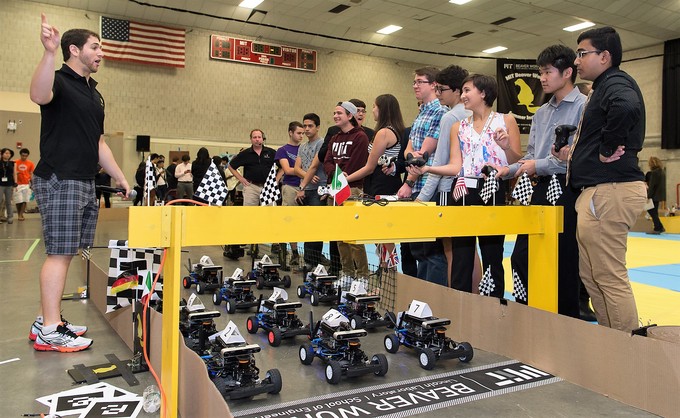MIT Beaverworks Summer Institute: Autonomous RACECAR Grad Prix
Summer 2016, 2017, 2018, 2019

MIT Beaverworks Summer Institute: Autonomous RACECAR Grad Prix
Summer 2016, 2017, 2018, 2019
Course Overview
Driverless vehicle technology has been growing at an exponential pace since the DARPA Grand and Urban Challenges pushed the state of the art to demonstrate what was already possible. Commercial interest and aggressive development are being driven by Google, Toyota, Tesla, Continental, Uber, Apple, NVidia, and many other companies. There is no single technology or “killer app” available to solve the myriad perception, understanding, localization, planning, and control problems required to achieve robust navigation in highly variable, extremely complex and dynamically changing environments. This summer, Beaver Works Summer Institute will offer nine teams of five students, each with its own MIT-designed RACECAR (Rapid Autonomous Complex Environment Competing Ackermann steeRing) robot, the opportunity to explore the broad spectrum of research in these areas, learn to collaborate, and demonstrate fast, autonomous navigation in a Mini Grand Prix to Move… Explore… Learn…Race!
This program consists of two components – an online course from January to May open to all interested students and a four-week summer program at MIT from July 5 to August 2 for a select group of students. The online component gives students a background in the basic concepts and tools that will be used during the summer program. Students will use a simulation in Unity to test their code and algorithms on virtual racetrack.
Completing the online curriculum will prepare students to cover the topics of Control Systems, Computer Vision, Localization, Planning, and Navigation at a more advanced level in the summer. The physical RACECAR is capable of achieving speeds of 40 mph, utilizing data from real sensors processed with an onboard NVidia TX-1 embedded computer. Such a demonstration of safe, robust autonomous navigation is a significant challenge. A team of experienced MIT researchers will provide the lectures each day, covering material that reviews autonomy fundamentals and expanding on advanced topic areas in the lecturers’ expertise. A series of graduated exercises, hands-on labs, and weekly challenge demonstrations will be provided to lead students through the process of developing their solutions to the fundamental problems. In addition, guest lecturers from among leading researchers in the computer science, engineering, and autonomous vehicle academic and corporate communities will provide students with insight into emerging trends in these fields.
My Roles
- Worked with 9-12 teams of 4-6 students to teach programming concepts and robotic algorithm design through the completion of autonomous tasks in a Python/ROS environment using the MIT RACECAR hardware platform
- Co-designed weekly challenges to ensure all teams developed the technical skills needed for the final race
- Co-designed and co-built the final race track spanning an entire indoor ice hockey rink